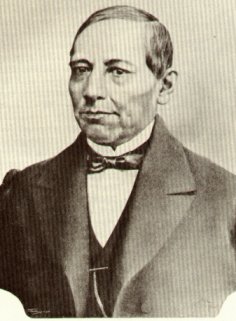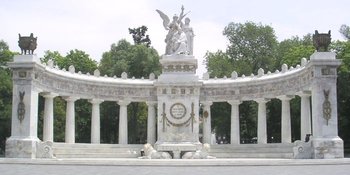|
|
Benito Juárez (March 21, 1806 – July 18, 1872) was a Zapotec Indian who served two terms (1861-1863 and 1867-1872) as President of Mexico. Juárez is often regarded as Mexico's greatest and most beloved leader. He is the first and only Native American to serve as President of Mexico.
| Contents |
Early Life
Benito Pablo Juárez García was born in the village of San Pablo Guelatao, Oaxaca. His parents were peasants who died before his fourth birthday. He worked in the corn fields and as a shepherd until the age of 12, then on December 17, 1818, he walked to the city of Oaxaca with a wish to educate himself and find a better life. At the time he was illiterate and could speak no Spanish, only Zapotec.
In the city he took a job as a domestic servant, and eagerly made up for his previous lack of education. A lay Franciscan named Antonio Salanueva was impressed with young Benito's intelligence and thirst for learning, and helped arrange for him to be accepted at the city seminary. He studied there but decided to pursue the law rather than the priesthood. He graduated from the seminary in 1827, then studied law.
Political Career
Juárez became a lawyer in 1834 and a judge in 1842. He was governor of the state of Oaxaca from 1847 to 1853, at which time he was sent into exile because of his objections to the corruption of Antonio López de Santa Anna. He spent his exile in New Orleans, Louisiana, working in a cigar factory.
Juárez returned to Mexico in 1855 and joined with the opposition liberales; two years later they triumphed and Juárez was made chief justice and vice-president of Mexico, under president Ignacio Comonfort. The conservadores rebelled and civil war erupted. Juárez succeeded Comonfort as provisional president. Juárez entered Mexico City on January 11, 1861 to reestablish national unity. He was elected President in March of that year for a four year term.
Following a debt dispute, France invaded Mexico in 1862, with plans by Napoleon III to establish a puppet regime there. After fierce fighting, including a victory whose anniversary is celebrated as Cinco de Mayo, Juárez and his elected government were forced to retreat to the northern part of the country.
Juárez led Mexican opposition to the French invasion and imposition of puppet emperor Maximilian of Habsburg. Maximilian offered Juárez amnesty, and later the post of prime minister, but Juárez refused to accept monarchy or a government imposed by foreigners. In 1867 the last of the French troops and allies of Maximilian were defeated and driven from the land. Maximilian was sentenced to death for treason by a military court. Despite international pleas for amnesty, Juárez refused to commute the sentence. That same year Juárez was reelected president.
Today Benito Juárez is remembered as being a progressive reformer dedicated to democracy, equal rights for the nation's indigenous or Indian population, and lessening the great power of the Roman Catholic Church then held over Mexican politics. The period of his leadership is known in Mexican history as La Reforma, and constituted a liberal political and social revolution with major institutional consequences: the expropriation of church lands, bringing the army under civilian control, and adoption of a federalist constitution.
Biographical Notes
Benito Juárez died of a heart attack while working at his desk in the National Palace in Mexico City.
Juárez's famous quotation continues to be well-remembered in Mexico: Entre los Individuos, como entre Las Naciones, El respeto al derecho ajeno es la paz, meaning "Between individuals, as between nations, respect for the rights of others is peace". It is inscribed on the State Flag of Oaxaca.
The anniversary of Juárez's birth (March 21) is a national holiday in Mexico (See: Fiestas Patrias).
See also: History of Mexico
Miscellany
Benito Mussolini was named after Juárez by his Socialist father.
Juárez has been represented in motion pictures by Paul Muni (1939), Jason Robards, Sr. (1940), Fausto Tozzi (1965), Helmut Schellhardt (1988), and Luis Valdez (1994)
Benito Juárez is a very common geographical name in Mexico. It is used for:
- A borough (delegación) of the Federal District: Benito Juárez, D.F.
- A municipality in the state of Guerrero: Benito Juárez, Guerrero.
- A municipality in the state of Quintana Roo: Benito Juárez, Quintana Roo.
- A municipality in the state of Tlaxcala: Benito Juárez, Tlaxcala.
- A municipality in the state of Veracruz: Benito Juárez, Veracruz.
- A municipality in the state of Nuevo León: Ciudad Benito Juárez, Nuevo León.
- Mexico City's airport: Benito Juárez International Airport.
- The state university of Oaxaca: Universidad Autónoma Benito Juárez de Oaxaca.
- Ciudad Juárez, Chihuahua, was renamed for Benito Juárez.
- Naucalpan de Juárez, municipality of Estado de México.
External links
- Mexico's Lincoln: The Ecstasy and Agony of Benito Juarez (http://www.mexconnect.com/mex_/history/jtuck/jtbenitojuarez.html)
- Timeline (http://www.zermeno.com/Benito%20Juarez.html)


